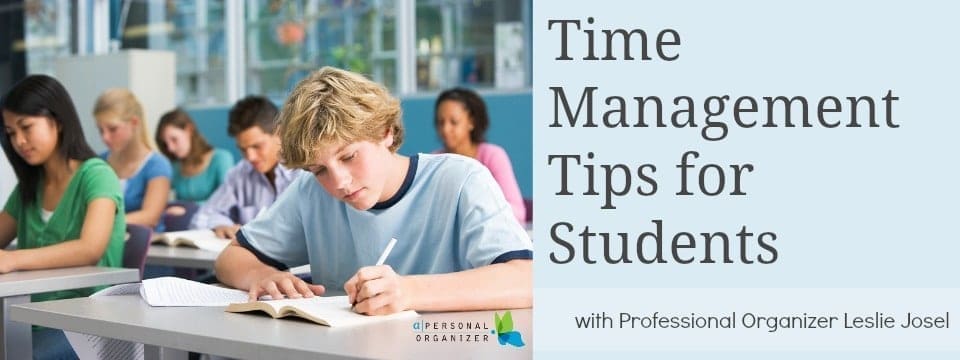Time Management Tips for Students with ADHD & Learning Disabilities

By Leslie Josel, ADHD Specialist & Founder of Order Out of Chaos
Time management is a challenge for everyone. And in this fast-paced culture, effective time-management skills are essential. However, students with LD and ADHD, find it even more challenging than other students. How can you help your student master basic time management strategies? Here are some helpful tools and tips.
- Use an academic planner to help your student plan and stay on track. Whether they use a paper planner or electronic calendar, make sure their planner is set up as a grid system so they can see their week at a glance. Record all their class assignments, after-school activities, work commitments, even plans with friends. This will allow them to know what they need to do AND when they have time to PLAN to get things done.
- Remind your student to do the hardest, longest or thing they least want to do first so that they will find it satisfying to move on to tasks they find more enjoyable.
- Analog clocks as opposed to digital clocks show that time moves and let your student know where they stand in relation to the rest of the hour or day. Hang an analog clock in each room that your student does homework so that they can see the “sweep” of time.
- Make their tasks achievable. Your student is more likely to complete their assignments if they are broken down into manageable parts. It is much easier to write one paragraph for an essay in an afternoon than it is to complete the entire research paper. Have them check their planner for available pockets of time and schedule accordingly. Setting unrealistic goals can set them up for failure.
- If your student is tackling a long-term project, begin by working with them to outline the goal of the project and break down each step into manageable parts. Assign deadlines for completing each one. Rely on visual organizational aids like planners, post-it calendars or wipe boards (my favorite) to record all important information and deadlines.
- Help your student determine how much time things take them to do. To become more realistic about how long certain tasks take, have them write down time estimates and then compare them to the actual time it took them to complete the task. The more a student records and corrects how long it takes them to do something, the better they will become in narrowing the gap between estimated and actual time.
- Devices such as timers and buzzers can help a student self-monitor AND keep track of time. For example, during quiet or reading time, a timer placed on a student’s desk can help the student know exactly where the time is going and also help the student become aware of when transitions to other activities will take place.
- If your student allows it, set it to music! Music is rhythm and rhythm is structure. And we all know that students with learning differences and attention deficits need structure. Music can help a student plan what to do next, anticipate and react as well as soothe and regulate the brain. Have your student create a 30-minute playlist of music they love. The key is to play the same playlist every time they sit down to work. Eventually, the music will act as a time marker and your student will know that when they hear “Bruno Mars” they are in the homestretch.
- Get active. Put “energy” into their tasks by having your student stand up to read or walk the dog while they review their notes. Or set up homework stations around your house and play “Hide the Homework” with your student. By adding energy and fun into their daily routine, you will keep them motivated and on-task.
It is important to help your students understand that just like any other muscle, strengthening their time management “muscle” takes consistent training. Learning to manage time requires learning new behaviors, developing unique strategies and a great deal of patience. I like to equate it to running a long distance marathon. As their “coach” we want to help our students identify their struggles, what skills are essential for them to carry out certain tasks and assist them in developing strategies and tools to help them make it to the finish line!
 Leslie Josel is the Principal of Order Out of Chaos, an organizing consulting firm specializing in students and chronic disorganization. She is a member of the National Association of Professional Organizers and holds her ADD and Hoarding Specialist certifications from the Institute for Challenging Disorganization. Leslie is known as a respected resource on ADHD and Executive Functioning in students and has been featured in national broadcast and print media on these subjects. Leslie is also the creator of the award-winning “Academic Planner: A Tool for Time Management.” Connect with Leslie at www.orderoochaos.com, on Facebook, Twitter and on Pinterest.
Leslie Josel is the Principal of Order Out of Chaos, an organizing consulting firm specializing in students and chronic disorganization. She is a member of the National Association of Professional Organizers and holds her ADD and Hoarding Specialist certifications from the Institute for Challenging Disorganization. Leslie is known as a respected resource on ADHD and Executive Functioning in students and has been featured in national broadcast and print media on these subjects. Leslie is also the creator of the award-winning “Academic Planner: A Tool for Time Management.” Connect with Leslie at www.orderoochaos.com, on Facebook, Twitter and on Pinterest.




